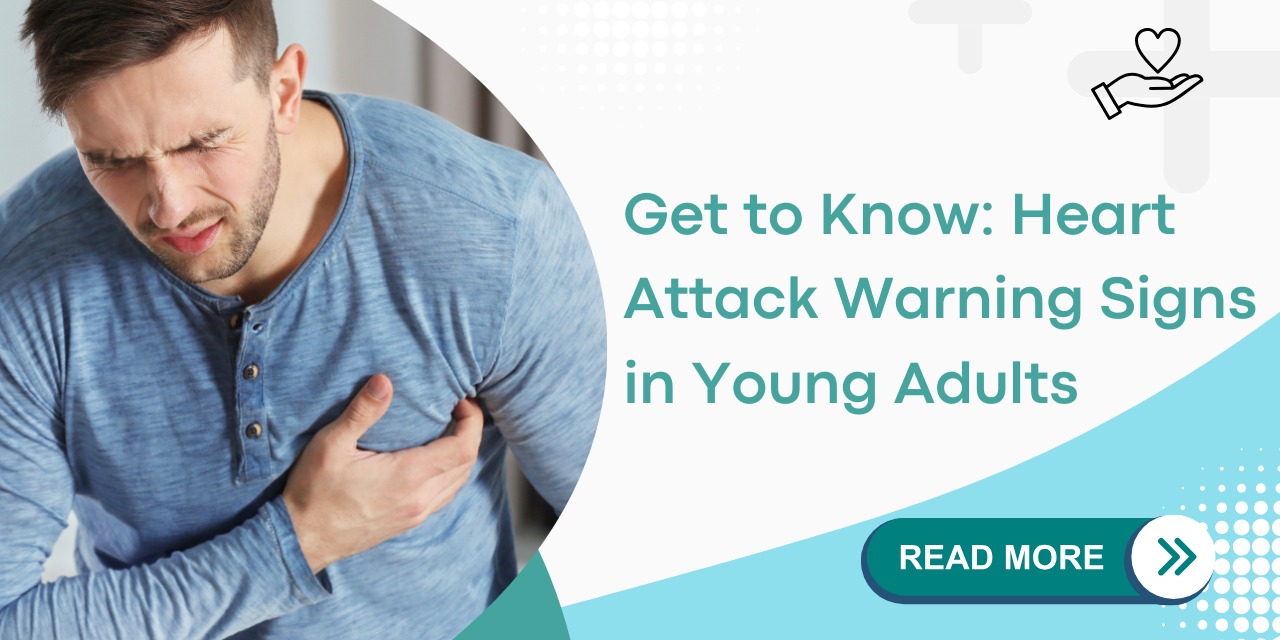Heart attacks are often associated with older adults, but they can occur in young adults as well. Recognizing the early warning signs of heart attacks in young adults is crucial for prompt treatment and prevention of serious health complications.
Common Symptoms of Heart Attacks in Young Adults
1. Chest Pain or Discomfort
A common sign of a heart attack is a feeling of pressure, tightness, or pain in the chest. This discomfort can last for more than a few minutes, or it might come and go.
2.Shortness of Breath
Difficulty breathing or shortness of breath can occur with or without chest discomfort. It might feel like you can’t catch your breath, even when resting.
3. Nausea or Vomiting
Some young adults may experience nausea, vomiting, or a general feeling of indigestion, which can be mistaken for gastrointestinal issues.
4. Pain in Other Areas
Pain can radiate to other parts of the body, including the arms, back, neck, jaw, or stomach. This pain may feel like a sharp, shooting sensation or a dull ache.
5. Cold Sweats
Sudden cold sweats or a clammy feeling can be a warning sign of a heart attack, especially if it occurs without any apparent cause.
6. Lightheadedness or Dizziness
Feeling lightheaded or dizzy can indicate that the heart is not pumping blood effectively, which is a serious concern.
7.Fatigue
Unusual or unexplained fatigue can be an early sign of a heart attack, especially if it is severe and does not improve with rest.
Causes of Heart Attacks in Young Adults
Understanding the causes of heart attacks in young adults can help in identifying risk factors and taking preventive measures. Some common causes include:
- Genetics
A family history of heart disease can increase the risk of heart attacks in young adults. Genetic factors play a significant role in determining heart health. - Lifestyle Choices
Poor diet, lack of physical activity, smoking, and excessive alcohol consumption are significant contributors to heart disease.
- High Blood Pressure
Hypertension can damage arteries over time, making them more susceptible to blockages that can lead to heart attacks.
- High Cholesterol
Elevated levels of cholesterol can lead to the buildup of plaques in the arteries, restricting blood flow to the heart.
- Obesity
Being overweight increases the risk of heart disease due to associated conditions like diabetes, hypertension, and high cholesterol.
- Diabetes
Diabetes significantly increases the risk of heart disease and heart attacks due to its effect on blood vessels and heart health.
- Stress
Chronic stress can lead to high blood pressure and other heart-related issues, increasing the risk of heart attacks.
- Substance Abuse
The use of recreational drugs, such as cocaine or methamphetamines, can cause severe cardiovascular problems, including heart attacks.
Self-Care for Heart Health
Maintaining a healthy heart is essential to preventing heart attacks and other cardiovascular diseases. Here are some self-care tips for promoting heart health:
➤ Healthy Diet
Eat a balanced diet rich in fruits, vegetables, whole grains, and lean proteins. Avoid excessive salt, sugar, and saturated fats.
➤ Regular Exercise
Engage in regular physical activity, such as walking, jogging, cycling, or swimming, for at least 30 minutes a day, five times a week.
➤ Avoid Smoking
Smoking is a major risk factor for heart disease. Quitting smoking can significantly improve heart health.
➤ Manage Stress
Practice stress-reducing techniques such as meditation, yoga, deep breathing exercises, or hobbies you enjoy.
➤ Regular Check-ups
Schedule regular health check-ups to monitor blood pressure, cholesterol levels, and overall heart health.
➤ Limit Alcohol Intake
Drink alcohol in moderation, if at all. Excessive alcohol consumption can increase blood pressure and contribute to heart disease.
➤ Maintain a Healthy Weight
Achieve and maintain a healthy weight through a balanced diet and regular exercise to reduce the strain on your heart.
Frequently Asked Questions
Can young adults have heart attacks?
Yes, while less common, young adults can have heart attacks. Risk factors include lifestyle choices, genetics, and underlying health conditions.
What should I do if I experience symptoms of a heart attack?
Seek emergency medical help immediately. Call emergency services or go to the nearest hospital.
How can I reduce my risk of a heart attack?
Maintain a healthy lifestyle with a balanced diet, regular exercise, stress management, and avoid smoking and excessive alcohol consumption.
Is chest pain always a sign of a heart attack?
No, chest pain can be caused by various conditions, but it is important to get it checked by a healthcare professional to rule out a heart attack.
How often should I get my heart health checked?
Regular check-ups are recommended, especially if you have risk factors for heart disease. Consult your doctor for personalized advice.
Taking proactive steps towards heart health can help prevent heart attacks and improve overall well-being. Remember, if you need heart treatment in Jalandhar, Shrimann Superspeciality Hospital and Dr. V. P. Sharma are here to provide the best care.
Conclusion
Early detection of heart attack symptoms in young adults can save lives. If you or someone you know experiences any of these symptoms, seek medical attention immediately. For advanced heart treatment in Jalandhar, the best heart doctors in Jalandhar can be found at Shrimann Superspeciality Hospital. Dr. V. P. Sharma and his team are dedicated to providing top-notch cardiac care.
Visit Shrimann Superspeciality Hospital Jalandhar for more information. Here is contact number for more inquiries: +91 181 5017777 .

